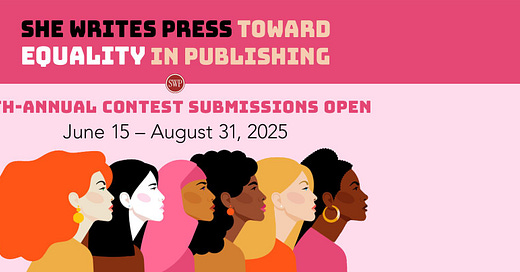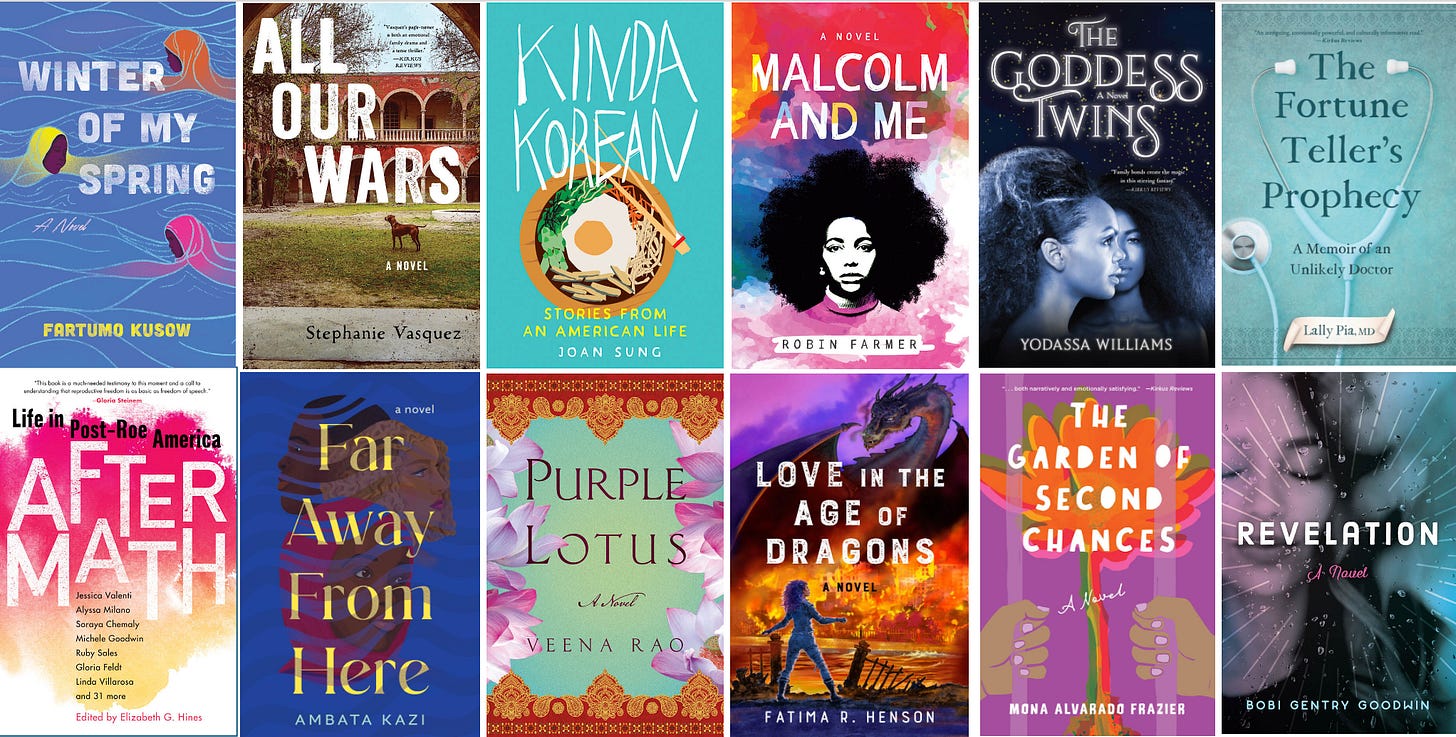She Writes Press 7th annual publishing contest
Why DEI in Publishing Matters More Than Ever and 7 Ways You Can Help
She Writes Press held its first STEP (She Writes Press Toward Equality in Publishing) contest in 2018 in an effort to diversify our publishing list. We skewed then, as now, very white. For anyone paying attention, publishing in general has historically skewed very white. But then 2020 rolled along, and George Floyd’s murder ushered in a meaningful social justice movement in this country. Publishing was one of many industries that was both under the gun to do something about its diversity problem, but also (in my estimation anyway) to genuinely welcome the change. We saw a real sea change in hiring decisions and in who was getting published. From where I sat, the call had been put out for publishing to do better, and publishing answered. Was it perfect? No. But things got better. We witnessed meaningful BIPOC hires and started to see many more authors of color across all sorts of publishing lists.
Now, under Trump 2.0, it’s unclear what publishing will do. In truth, the backlash started well before Trump was ushered back into office. In an Atlantic article from last summer called “Has the DEI Backlash Come for Publishing?” Dan Sinykin and Richard Jean So tracked the quick rise and fall of the publishing industry’s commitment to its diversity efforts in the wake of the dismissal of two high-profile Black hires: Lisa Lucas at Penguin Random House and Tracy Sherrod at Hachette. In the piece they conclude:
“Publishing has failed to invest in the infrastructure needed to discover and develop the latent readership for these books. And many argue that the industry itself still isn’t supportive of people of color in its ranks.”
People still aren’t over Lucas’s dismissal in particular. It was a major knife to the heart—in part because she’s so beloved and celebrated, and in part because Penguin Random House made such a fuss over her hire. A month after The Atlantic article, the New York Times published a piece called “‘A Lot of Us Are Gone’: How the Push to Diversify Publishing Fell Short.”
And all this was summer of 2024, well before the Trump administration’s attacks on Black history, before his recent “Truth” that disparaged Juneteenth. In case you’re not tracking this story, read this weekend’s “How Trump Treats Black History Differently Than Other Parts of America’s Past.”
Like a lot of people in this country, I went through my share of DEI training in 2020-2021. As a white person in a very white industry, I found it eye-opening and often difficult. You are not doing the work if you don’t find it difficult. The trainings could be confrontational—because they require you take a hard look at your privilege. They require that you consider how you got where you are.
I’ve been proud of publishing in these past years. I’ve been proud to work in an industry that took seriously the call to learn, to stand up for marginalized voices. And I’ve been gratified to see so many authors of color getting published. It has been real and noticeable, and anecdotally, I’ve seen more white readers reading and celebrating authors of color as a result. When people have asked me my thoughts about white writers not being able to get published in recent years, which you heard a lot circa 2020-2024, my answer was that white authors were maybe being published less than before, but this signified a righting of the ship. And the truth is, we didn’t even get close to parity. This is the analysis from The Atlantic article which shows progress, yes, but not exactly hardship for white writers.

Back to the She Writes Press STEP program. We started in 2018 because we took seriously the critique that our list was very white. I continue to take this seriously. It’s extra challenging for us as a hybrid publisher because hybrid publishing requires author investment. A couple of my Black publisher colleauges who work in the hybrid space have talked to me about how important it is to them to keep their costs low so that they can publish majority writers of color—and one is leaving the industry and the other is breaking even and supplementing her publishing endeavors with other work. There are no easy answers here.
We find ourselves in a challenging moment. DEI is suddenly a dirty word in certain government spheres. Some feel relieved to be in post-DEI world because diversity, equity, and inclusion made them uncomfortable to begin with. The backlash is real, and you can feel it brewing. There’s an old truism about two steps forward, one step back. This has been a felt experience of the past five years; 2020-2023 felt like a leap forward in our national awareness around inequity, but already we started to step back last year, and now we’re witnessing outright hostility.
STEP is just one small way to elevate voices of color. And there are many ways for any of us to continue to honor the progress and move the needle—especially in light of what we’re witnessing:
• Buy and read works by authors of color
• Recommend authors of color for panels, podcasts, and other literary events
• Review books by authors of color (Goodreads, Amazon, social media)
• Elevate writers of color on social media by posting about and celebrating their work
• Open conversations about writers of color being involved in things you’re involved in—be it writers’ conferences, bookstore events, or retreats
• If you’re in a position to, sponsor a writer of color for an event you’re involved in
• Spread the word everywhere about the She Writes Press STEP contest and to help us find our next two amazing winners (thank you!)
Culturally, white writers still have all the advantages. As such, it’s extremely important that white writers be allies to writers of color. Sometimes it’s uncomfortable to be a white person having conversations about why it’s so important to elevate voices of color, but one thing I know from my own practice and experience is that the more you do it, the easier and more natural it gets. And once it’s in you, it’s not leaving. Once a vocal ally, you’re a forever ally—and allies, we are needed!
Here are our STEP winners from 2018-2024 (with three more in process and many more on the horizon). Thanks for heping me celebrate these amazing writers by spreading the word about STEP to friends and community via email, social media, restacking here, or by pigeon post. Bless!








Winning the STEP scholarship to publish The Garden of Second Chances wasn’t just a personal milestone. My writing confidence was restored. No one wanted a story of incarcerated teens with a Mexican main character and teens who were mostly Black or Latinas, unless it was sensationalized like Orange is the New Black. As a writer of color, I know firsthand how many doors are still closed to us in publishing, and how much our stories are needed. That scholarship gave my work a chance to be seen. The book has won two awards and excellent reviews—proof that readers are hungry for stories from voices that haven’t always been heard.
DEI in publishing isn’t just a buzzword—it’s a responsibility. Representation matters not only for BIPOC writers but for readers of every background. This takes support from non-BIPOC readers—reading, reviewing, and recommending our books to friends, libraries, and schools. This helps shift the tide and make room for more stories like mine.
When you buy a book by a BIPOC author, you're helping to rewrite the narrative of who gets to tell stories and whose stories are seen as worth telling. PS: I have a second novel published, which also went on to be starred reviewed and win two other awards.
I appreciate the work you (Brooke) and your team do for STEP. I know there will be more award winners who publish and go on to write many more wonderful books. Thank you!
What's interesting is that I have been reading black and indigenous writers long before DEI. Not because they are black or indigenous, but because they are outstanding writers! Reading this post I reflected upon what/whom I read, and looked towards the pile of books beside my desk. A collection that is dominated by immigrant writers writing in their second, or third languages (Elif Shafak is just one example), Bernardine Evaristo, Teresse Marie Mailhot, Frederick Joseph, Ocean Vuong... My personal favourite writer (who I am honoured to call a friend and creative collaborator) is Aïcha Martine Thiam whose work I can't shut up about (yes, please do check her out!). I'm not even making an effort here. I truly believe that there is room for everyone and good writing resonates with everyone, regardless of race.
I personally like to keep my reading as varied as possible, and that includes reading in six languages, because the beauty of these languages doesn't always translates as well into English... :)